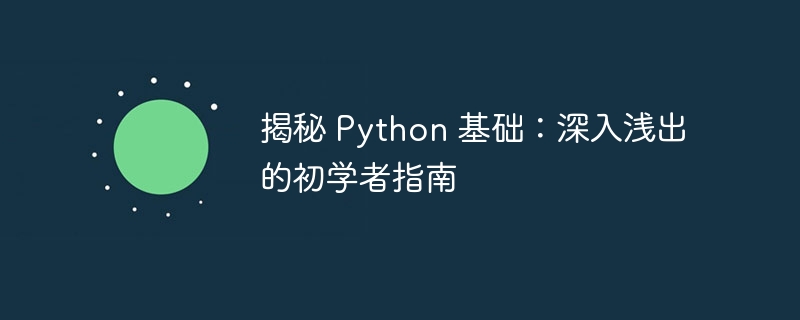
python is a popular and versatile high-level programming language. With its easy-to-understand syntax, rich library and modules, and strong community support, Python has become an ideal choice for both beginners and experienced developers.
type of data
- Integer (int): Integer value, no decimal part.
- Floating point number (float): Numeric value with decimal part.
- Boolean value (bool): True or False.
- String (str): Text consisting of a sequence of characters.
- List (list): A set of ordered elements, which can be any data type.
- Tuple (tuple): An immutable collection of ordered elements, which can be any data type.
- Dictionary (dict): A collection of key-value pairs, where the key is unique and the value can be of any data type.
Operator
- Arithmetic operators: (addition), - (subtraction), * (multiplication), / (division), % (remainder).
- Comparison operators: == (equal), != (not equal), < (less than), > (greater than), <= (less than or equal to), >= (greater than or equal to).
- Logical operators: and (and), or (or), not (not).
Control flow
- Conditional statements: if, elif, else.
- Loop statement: for, while.
- Function: A reusable block of code that performs a specific task.
- Class: A blueprint used to define objects, including data members and methods.
- Module: A reusable unit of code containing functions, classes, and variables.
Standard Library
The Python standard library provides a series of built-in functions, classes, and modules for handling a variety of common tasks:
- Operating System: Interacts with Operating System.
- File processing: Reading and writing files.
- JSON: Interact with JSON data.
- Regular Expressions: Match and manipulate text.
- Scientific Computing: NumPy, SciPy and other libraries.
Community Support
- Documentation: The official documentation provides comprehensive information about syntax, libraries and modules.
- Forums and Discussion Groups: Online communities provide support and discussion.
- Blogs and Tutorials: A wealth of resources to help both beginners and experienced developers learn Python.
Tips for learning Python
- Exercise: Reinforce concepts through coding exercises.
- Documentation: Always refer to the official documentation for accurate information.
- Community: Join an online community to find support and learn tips.
- Build Project: Apply your knowledge by building Project.
- Be Patient: Learning any Programming language takes time and effort.
The above is the detailed content of Demystifying Python Basics: A Beginner's Guide. For more information, please follow other related articles on the PHP Chinese website!






